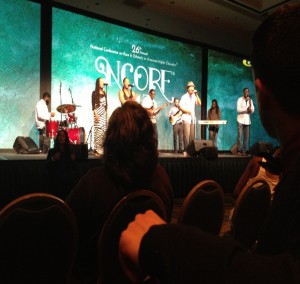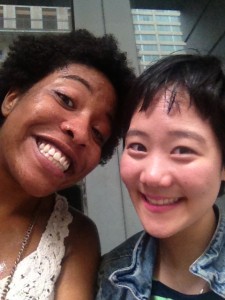By Felicia Byrd
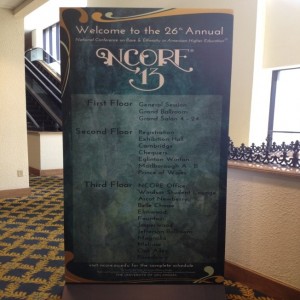 The National Conference on Race and Ethnicity 2013 was a great experience for me. I enjoyed the institutes I was able to attend. I was able to share some of my past experiences, and learn from the past experiences of others. I made valuable connections with student representatives from other campuses who have agreed to keep me posted on their progress as far as their movements for sustainable inclusion on their campuses and vice versa. The Conference was, to me, the epitome of “diverse” from the range in age, representatives from different universities and colleges, and finally cultural and ethnic backgrounds.
The National Conference on Race and Ethnicity 2013 was a great experience for me. I enjoyed the institutes I was able to attend. I was able to share some of my past experiences, and learn from the past experiences of others. I made valuable connections with student representatives from other campuses who have agreed to keep me posted on their progress as far as their movements for sustainable inclusion on their campuses and vice versa. The Conference was, to me, the epitome of “diverse” from the range in age, representatives from different universities and colleges, and finally cultural and ethnic backgrounds.
 On Tuesday, May 28 I attended Advancing Your Career: What You Need to Know to Advance in Higher Education-From Hair to Credentials hosted by Narcisa A. Polonio, Ed.D. Mrs. Polonio is the Vice President for Education, Research, and Board Leadership Service at the Association of Community College Trustees (ACCT). I really enjoyed the message Dr. Polonio taught to us. She was straight forward and to the point. She gave us a list of rules to live by in whether in School, or the Work force. One never quit a job before you have another one. It is important to remember that some of the jobs we perceive as less than or bad; would be cherished to others. The second rule is that people in your work space or environment will remember you for what you last position was in the company or organization. You should not take this offensively you should take this as an opportunity to show how willing you are to learn and adapt to different situations. She gave an entire check list to of things you need to know in order to
On Tuesday, May 28 I attended Advancing Your Career: What You Need to Know to Advance in Higher Education-From Hair to Credentials hosted by Narcisa A. Polonio, Ed.D. Mrs. Polonio is the Vice President for Education, Research, and Board Leadership Service at the Association of Community College Trustees (ACCT). I really enjoyed the message Dr. Polonio taught to us. She was straight forward and to the point. She gave us a list of rules to live by in whether in School, or the Work force. One never quit a job before you have another one. It is important to remember that some of the jobs we perceive as less than or bad; would be cherished to others. The second rule is that people in your work space or environment will remember you for what you last position was in the company or organization. You should not take this offensively you should take this as an opportunity to show how willing you are to learn and adapt to different situations. She gave an entire check list to of things you need to know in order to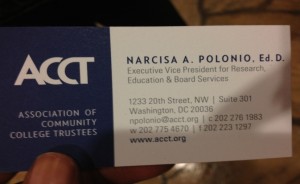 advance in Higher Education. The List ranged from Appearance to Credentials to a Readiness Profile. For each step she walked us through a process to gauge our position or rank in or professional lives and how we could progress. My favorite piece of advice that Dr. Polonio gave was that we should always dress two positions above our actual rank because would never see an athlete wear a suit and tie at their game; no they dress for the part. I truly valued that piece of wisdom.
advance in Higher Education. The List ranged from Appearance to Credentials to a Readiness Profile. For each step she walked us through a process to gauge our position or rank in or professional lives and how we could progress. My favorite piece of advice that Dr. Polonio gave was that we should always dress two positions above our actual rank because would never see an athlete wear a suit and tie at their game; no they dress for the part. I truly valued that piece of wisdom.
 Another lecture I attended entitled Finding Your Voice: The Keys to Your Greatest Potential which was hosted by one of the keynote speakers, Charles Holt, Actor, Recording Artist, Author, Charles Holt Productions—Los Angeles, CA. I really enjoyed this lecture as well because I was able to hear people’s perspectives and experiences with recognizing diversity on their college campuses and creating a tangible spirit of inclusion. Mr. Holt focused on five key principles community, excellence, equanimity, faith and service. He used these principles to spark questions and discussion amongst our group so that we were able to create our own definition of community and what we feel a community should look like, and be a role model for the type of community we like to have on our campuses.
Another lecture I attended entitled Finding Your Voice: The Keys to Your Greatest Potential which was hosted by one of the keynote speakers, Charles Holt, Actor, Recording Artist, Author, Charles Holt Productions—Los Angeles, CA. I really enjoyed this lecture as well because I was able to hear people’s perspectives and experiences with recognizing diversity on their college campuses and creating a tangible spirit of inclusion. Mr. Holt focused on five key principles community, excellence, equanimity, faith and service. He used these principles to spark questions and discussion amongst our group so that we were able to create our own definition of community and what we feel a community should look like, and be a role model for the type of community we like to have on our campuses.
During NCORE I attended at least two workshops a day some I really enjoyed, and some I felt I could have spent my time more wisely. I had heard from others that S. Michelle Coleman of California Institute of Integral Studies, San Francisco, CA had given a lecture called I Am Not My Hair: Honoring the Hairstory in Your History which was very popular amongst all women who had attended NCORE in the past. When I first arrived I was under the impression that we would actually be discussing the history aspect of women and our hair and what our hair meant to us. I really did not enjoy it that much because I felt we spent too much time discussing our present struggles with our hair, and I felt it became repetitive and redundant after a while.
Finally the most thought provoking experience I had while at NCORE was when I attended the Film Preview and Discussion for The N!GGER Word: Is the a Message in the Madness? This film uses interviews and commentary from a diverse multitude of people. In the film questions like; What is the meaning of the N!gger word in society today? Will it ever die out or lose its power? Is there a subliminal message behind the word? Can something that was meant to be derogatory now be uplifting? The one thing in the video that stuck with me the most is when one of the people who were interviewed said they viewed the use of the word as a form of self-oppression. They felt that because African Americans still harbored so much pain from how their ancestors were treated that they see it as taunting past oppressors as if to say You can’t say it, but I can!.” This is normally because people of the fairer race fear the consequences of using that word around African Americans.
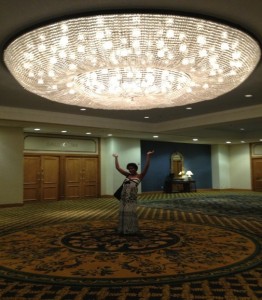 All in all I think NCORE 2013 was the total experience. I met new people from all over the nation and I got to experience Higher learning in a predominantly diverse setting. I do not even possess the words to describe how great a time I had in the city of New Orleans alongside my peers. I feel that NCORE will only get better with time; and I would recommend the conference for anyone looking for guidance on improving relations on University and College campuses across the US.
All in all I think NCORE 2013 was the total experience. I met new people from all over the nation and I got to experience Higher learning in a predominantly diverse setting. I do not even possess the words to describe how great a time I had in the city of New Orleans alongside my peers. I feel that NCORE will only get better with time; and I would recommend the conference for anyone looking for guidance on improving relations on University and College campuses across the US.

